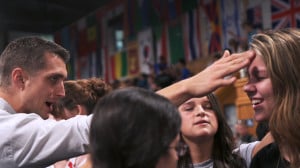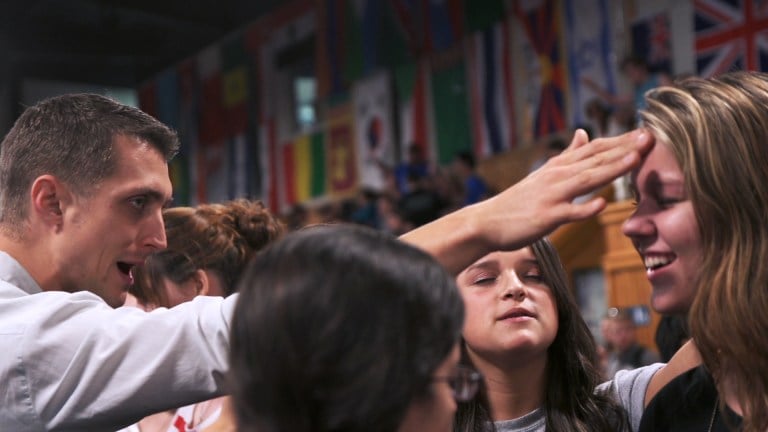Roger Ross Williams’ latest film, “God Loves Uganda,” outlines the role of American evangelicals in Uganda’s anti-gay movement, especially the 2009 Anti-Homosexuality Bill. The documentary follows missionaries from the International House of Prayer, a Kansas City-based mega-church, as they travel to Uganda, proselytizing against “sexual immorality.” Arts & Life spoke to Williams about his important, if profoundly disturbing, new film.

Arts & Life (AL): How were you first drawn to this topic?
Roger Ross Williams (RW): Well, I grew up in the African American Baptist church, from a family of ministers. When I started hearing about what was going on with the Anti-Homosexuality Bill and that it was fueled by religion, I was naturally drawn to it. I grew up in a church that was not accepting of my sexuality as a gay man, so I was very sensitive to this topic.
AL: In the film, the International House of Prayer’s spokespeople seem totally sure of their mission and methods. Did you encounter anyone who seemed ambivalent?
RW: I think that kids who are were young and quite naive had been in a training course at the International House of Prayer — IHOP U, they call it — for many months, preparing for this mission. For all of them, their life goal is to be missionaries for the rest of their lives. I think they really strongly believe.
If there were any doubt, I wouldn’t have known becaus even though it’s hard to see this in the film, my access to them was restricted by IHOP, just for that reason. I always had to have an IHOP representative around, and I could only question certain handpicked people because they were worried about the message.
AL: How did you pick to focus on the International House of Prayer? Were there other organizations that have been similarly active in Uganda?
RW: There are tons, I mean, hundreds of churches like IHOP. IHOP is just one of many, and, I have to say, they’re not the… most egregious. I chose IHOP because of Jo Anna Watson [a missionary who has traveled to Uganda since 2002] and Lou Engel, a well-known figure in the evangelical world. He does “The Call,” these stadium-size youth prayer rallies — mostly college kids, like yourself. His message is to empower people to fight against abortion, homosexuality and the threat of Islam.
AL: The movie speaks to the relationship between political corruption and economic problems in Uganda and the use of homosexuals as a distraction from policy issues. How are economic and political development linked to gay rights in Uganda?
RW: Well, Uganda is unique. Uganda was targeted very early on, after the fall of Idi Amin, by American conservatives [who saw Uganda] as a country that they could actually take over. American conservatives rebuilt the schools and helped rebuild that country, so Ugandans are very grateful.
Most of the members of parliament — the President and especially the First Lady of Uganda — are conservative fundamentalist Christians. All the politicians in Uganda play to their fundamentalist benefactors in America because of the flow of money.
Uganda is one of the most corrupt countries in the world. [Yoweri] Museveni [current President of Uganda] is the longest-running ruling dictator. They bring out the [Anti-Homosexuality] Bill out every time they want to distract the international community and the public from other issues… By creating a monster out of the vulnerable homosexual community, it allows people to focus their anger elsewhere, instead of on the government. So the government politicians use this — they’re like, “Don’t worry about the corruption going on in the government or jobs or healthcare, worry about this moral force that’s coming in to recruit your children and destroy your lives.”
AL: In your documentary, you spend some time on the Bush and Obama administrations’ different approaches to combating AIDS and addressing violence against homosexuals in Uganda. What have other actors, such as the United Nations and international NGOs, done — or not done — to promote human rights for LGBTQ people in Uganda?
RW:U.S. government has done a lot of great work, but it has been quietly behind the scenes. You know, Obama did make a pubic statement against Uganda, and the issue was really important to former Secretary of State Hillary Clinton, who made a groundbreaking speech that gay rights are human rights. The State Department [has been] quietly helping the activists on the ground… There are many human rights organizations that are working hard to stop the bill. I think that’s one of the reasons why the bill has not passed — because of the work of all these organizations.
I think, on the other hand, the Obama administration has allowed certain policies that had been put in place under the Bush administration to remain. He hasn’t dismantled them. So a lot of the PEPFAR [President’s Emergency Plan for AIDS Relief] aid going into Uganda is administered by faith-based organizations, who refuse to recognize the LGBTI community as an “at-risk” group, so they don’t receive treatment and funding and testing and ARVs [antiretroviral drugs]. That’s a problem.
AL: Moving forward, what do you see as the best way to fight the “culture war” in Uganda? Where do you see hope for mitigating the anti-gay movement?
RW: I think, as young college students, you guys have a great opportunity to offer an alternative voice. Go to Uganda — you know, go to Uganda as students in exchange programs. Actually, it’s just about education and a connection. Many Ugandans believe they’ve never met a homosexual… We have a campaign right now with allout.org about people of faith, and it’s about keeping hate out of the collection plate. People in churches across America [may not] realize that some of the money they think is going to fund good works in Uganda are going to fund intolerance and hatred. We’ve got to cut off the flow of money, so that they know that American people of faith won’t stand for intolerance or harming anyone or, heaven forbid, killing anyone in the name of the Bible.
